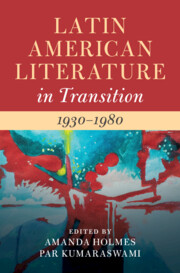Book contents
- Latin American Literature in Transition 1930–1980
- Latin American Literature in Transition
- Latin American Literature in Transition 1930–1980
- Copyright page
- Contents
- Contributors
- Introduction
- Part I War, Revolution, Dictatorship
- Chapter 1 Revolutions and Literary Transitions
- Chapter 2 Jorge Luis Borges
- Chapter 3 Anti-Fascism and Literature in Brazil
- Chapter 4 Disaster Innovation in the Mid-century Spanish American Novel
- Chapter 5 Struggle at the Margins
- Part II Metropolis and Ruins
- Part III Solidarity
- Part IV Aesthetics and Innovation
- Index
- References
Chapter 2 - Jorge Luis Borges
Probing the Limits of World War
from Part I - War, Revolution, Dictatorship
Published online by Cambridge University Press: 24 January 2023
- Latin American Literature in Transition 1930–1980
- Latin American Literature in Transition
- Latin American Literature in Transition 1930–1980
- Copyright page
- Contents
- Contributors
- Introduction
- Part I War, Revolution, Dictatorship
- Chapter 1 Revolutions and Literary Transitions
- Chapter 2 Jorge Luis Borges
- Chapter 3 Anti-Fascism and Literature in Brazil
- Chapter 4 Disaster Innovation in the Mid-century Spanish American Novel
- Chapter 5 Struggle at the Margins
- Part II Metropolis and Ruins
- Part III Solidarity
- Part IV Aesthetics and Innovation
- Index
- References
Summary
This essay examines Borges’ engagement with the structure of totality in the context of the two world wars in “Deutsches Requiem” and “El jardín de senderos que se bifurcan.” In both stories Borges depicts the ideal of a single totalizing order that underlies the world wars. This ideal is associated with long-standing epistemological and technological apparatuses, including history, philosophy, philology, and literature, but it is also refigured and reinforced in twentieth-century modernity through new forms of telecommunication, warfare, and transportation. Although these war stories seem to demonstrate the imminence of a global sovereignty, both epistemological and political, they also probe the limits of the drive to totality, stressing points of fissure and excess that represent the condition of possibility for a different experience of reality, relationality, and, ultimately, world.
Keywords
- Type
- Chapter
- Information
- Latin American Literature in Transition 1930–1980 , pp. 32 - 45Publisher: Cambridge University PressPrint publication year: 2022

